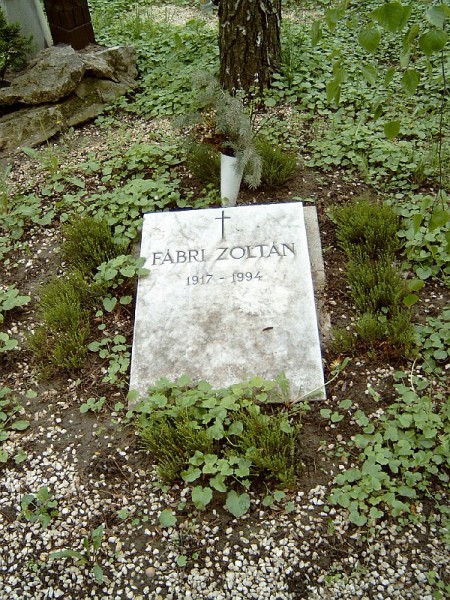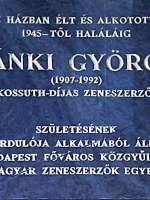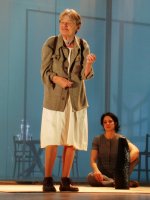Zoltán Fábri is a Actor, Director, Scriptwriter and Production Design Hongrois born on 16 october 1917 at Budapest (Hongrie)

Zoltán Fábri (15 October 1917 – 23 August 1994) was a Hungarian film director and screenwriter. His films The Boys of Paul Street (1969) and Hungarians (1978) were nominated for the Academy Award for Best Foreign Language Film. His 1965 film Twenty Hours shared the Grand Prix with War and Peace at the 4th Moscow International Film Festival. His 1969 film The Toth Family was entered into the 7th Moscow International Film Festival. His 1975 film 141 Minutes from the Unfinished Sentence was entered into the 9th Moscow International Film Festival, where he won a Special Prize for Directing.
Fábri wanted to become an artist from an early age on. He studied painting and graduated at the Hungarian College of Fine Arts. He began working in the Hungarian film industry in 1950 as a production designer. He directed his first film Vihar (Storm) in 1951. He became an internationally acclaimed director with his third feature Körhinta (Merry Go-Round) in 1956. He continued directing and writing until the early 1980s. After his retirement from the film industry Fábri taught on the Hungarian University of Theatrical and Film Arts. In his last years he wrote screenplays; they were never made. Fábri was also the president of the Hungarian Film Artist Union from 1959 to 1981.
Fábri's style of filmmaking can be described mainly as "classical", using academic techniques of art filmmaking. His greatest influences were the Italian Neorealism and French Poetic Realism. He experimented with narrative and flashback techniques for a while in the 1960s (in his films Nappali sötétség and Húsz óra) and his 1976 film Az ötödik pecsét contains some highly surrealist scenes, but overall he never used the mannerisms of modernist film in his works. For this reason the Kádár regime favored Fábri over more controversial and experimental directors like Miklós Jancsó. The film won the Golden Prize at the 10th Moscow International Film Festival and was entered into the 27th Berlin International Film Festival.
At the 11th Moscow International Film Festival in 1979, he was awarded with the Honorable Prize for the contribution to cinema.
He was known as a perfectionist who wrote, drawn and choreographed every scene to the most precise detail months before production began and never improvised anything. His reputation as a rigid, tyrannical director was somewhat contradicted by his friendly and kind behaviour towards the British and American child actors on the set of The Boys of Paul Street.
Fábri made nearly all of his films based on literary material (novels or short stories) and wrote the screenplays himself. His constant theme was the question of humanity. Many of his films are set in or around World War II. Two of his frequent collaborators were actress Mari Törőcsik and cinematographer György Illés. In 1969 he played the role of prosecuted statesman Zoltán Dániel in his friend Péter Bacsó's cult satire, A tanú (The Witness) as his sole acting job.
Fábri died in a heart attack at the age of 76 in 1994.
Devenu acteur, il signa également quelques mises en scène théâtrales. L'avènement de la Seconde Guerre mondiale interrompit le cours de sa carrière et les événements liés à ce conflit le marqueront à tout jamais : des films comme Le Professeur Hannibal (1956), Deux mi-temps en enfer (1962) et Les Ténèbres du jour (1963) en portent témoignage. Après-guerre, il devint directeur artistique du Théâtre de la Jeunesse, puis fut appelé, en 1950, à la tête de la production cinématographique hongroise nationalisée. Il y apprit son métier et réalisa son premier film en 1952 Orage, drame social situé en milieu rural. Son Petit carrousel de fête, présenté au Festival de Cannes, lui valut une reconnaissance mondiale et lança l'actrice Mari Törőcsik. En 1964, il signa un film remarquable sur vingt ans d'expérience socialiste en Hongrie : Vingt heures. Zoltán Fábri est avec Károly Makk et Félix Máriássy l'un des artisans de la première renaissance du cinéma hongrois, située entre l'année de la mort de Staline et l'insurrection de Budapest de 1956.
Source : Wikidata
Zoltán Fábri

Nationality Hongrie
Birth 16 october 1917 at Budapest (Hongrie)
Death 23 august 1994 (at 76 years) at Budapest (Hongrie)
Awards Kossuth Prize
Birth 16 october 1917 at Budapest (Hongrie)
Death 23 august 1994 (at 76 years) at Budapest (Hongrie)
Awards Kossuth Prize
Fábri wanted to become an artist from an early age on. He studied painting and graduated at the Hungarian College of Fine Arts. He began working in the Hungarian film industry in 1950 as a production designer. He directed his first film Vihar (Storm) in 1951. He became an internationally acclaimed director with his third feature Körhinta (Merry Go-Round) in 1956. He continued directing and writing until the early 1980s. After his retirement from the film industry Fábri taught on the Hungarian University of Theatrical and Film Arts. In his last years he wrote screenplays; they were never made. Fábri was also the president of the Hungarian Film Artist Union from 1959 to 1981.
Fábri's style of filmmaking can be described mainly as "classical", using academic techniques of art filmmaking. His greatest influences were the Italian Neorealism and French Poetic Realism. He experimented with narrative and flashback techniques for a while in the 1960s (in his films Nappali sötétség and Húsz óra) and his 1976 film Az ötödik pecsét contains some highly surrealist scenes, but overall he never used the mannerisms of modernist film in his works. For this reason the Kádár regime favored Fábri over more controversial and experimental directors like Miklós Jancsó. The film won the Golden Prize at the 10th Moscow International Film Festival and was entered into the 27th Berlin International Film Festival.
At the 11th Moscow International Film Festival in 1979, he was awarded with the Honorable Prize for the contribution to cinema.
He was known as a perfectionist who wrote, drawn and choreographed every scene to the most precise detail months before production began and never improvised anything. His reputation as a rigid, tyrannical director was somewhat contradicted by his friendly and kind behaviour towards the British and American child actors on the set of The Boys of Paul Street.
Fábri made nearly all of his films based on literary material (novels or short stories) and wrote the screenplays himself. His constant theme was the question of humanity. Many of his films are set in or around World War II. Two of his frequent collaborators were actress Mari Törőcsik and cinematographer György Illés. In 1969 he played the role of prosecuted statesman Zoltán Dániel in his friend Péter Bacsó's cult satire, A tanú (The Witness) as his sole acting job.
Fábri died in a heart attack at the age of 76 in 1994.
Biography
Zoltán Fábri se sentit très tôt attiré par l'art : il suivit, après ses études au lycée, des cours aux Beaux-Arts, puis, recherchant un mode d'expression plus personnel et plus universel, se tourna vers l'École supérieure d'art dramatique (Színművészeti Főiskola) de Budapest, dont il sort diplômé en 1941.Devenu acteur, il signa également quelques mises en scène théâtrales. L'avènement de la Seconde Guerre mondiale interrompit le cours de sa carrière et les événements liés à ce conflit le marqueront à tout jamais : des films comme Le Professeur Hannibal (1956), Deux mi-temps en enfer (1962) et Les Ténèbres du jour (1963) en portent témoignage. Après-guerre, il devint directeur artistique du Théâtre de la Jeunesse, puis fut appelé, en 1950, à la tête de la production cinématographique hongroise nationalisée. Il y apprit son métier et réalisa son premier film en 1952 Orage, drame social situé en milieu rural. Son Petit carrousel de fête, présenté au Festival de Cannes, lui valut une reconnaissance mondiale et lança l'actrice Mari Törőcsik. En 1964, il signa un film remarquable sur vingt ans d'expérience socialiste en Hongrie : Vingt heures. Zoltán Fábri est avec Károly Makk et Félix Máriássy l'un des artisans de la première renaissance du cinéma hongrois, située entre l'année de la mort de Staline et l'insurrection de Budapest de 1956.
Usually with
Filmography of Zoltán Fábri (13 films)
| Year | Name | Job | Roles |
|---|---|---|---|
| 1982 | Requiem | Director, Scriptwriter | |
| 1979 | The Witness | Actor | Zoltán Dániel |
| 1978 | Hungarians | Director, Writer | |
| 1976 | The Fifth Seal | Director, Writer | |
| 1975 | 141 Minutes from the Unfinished Sentence | Director, Scriptwriter | |
| 1969 | The Boys of Paul Street | Director, Writer | |
| 1969 | The Toth Family | Director, Scriptwriter | |
| 1965 | Twenty Hours | Director | |
| 1961 | The Brute | Director, Writer | |
| 1961 | Two Half-Times in Hell | Director, Writer, Production Design | |
| 1958 | Sweet Anna | Director, Writer, Production Design | |
| 1956 | Merry-Go-Round | Director, Writer, Production Design | |
| 1956 | Professor Hannibal | Director, Writer |
 Connection
Connection



